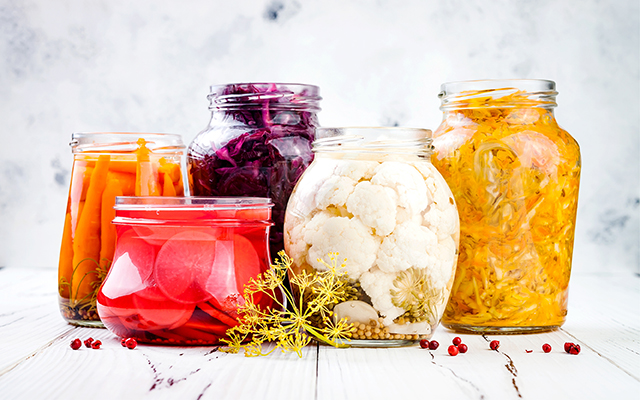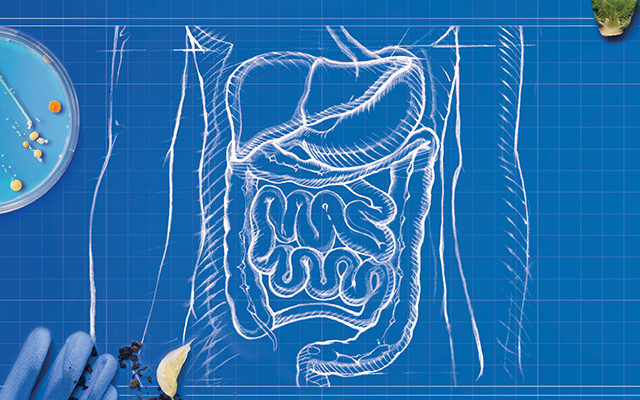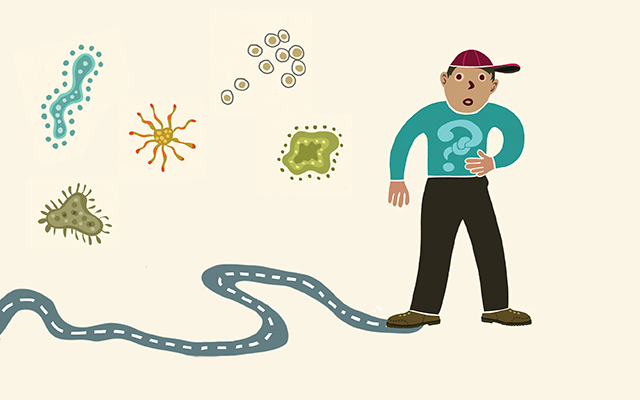Feeling bloated? You’re not alone.
As many as one in three Americans report symptoms of bloating. Although many factors can trigger that gassy or distended feeling, including stress, antibiotics, and eating too little (or even too much) fiber, the vast majority of these are “benign and fixable,” writes integrative gastroenterologist Robynne Chutkan, MD, in her book The Bloat Cure: 101 Natural Solutions for Real and Lasting Relief.
What’s more, most of the causes are easily treatable with simple lifestyle interventions — and most people don’t need to wade through all the possible causes to figure out a way to feel better. Why? Because when it comes to bloating, there are a few top culprits, says functional-medicine practitioner Michael Ruscio, DC. Round up the usual suspects, use lifestyle strategies to identify and address them, and in many cases the problem is solved.
Here are the four top causes of bloating and ways to address them, followed by some of the less common culprits (for those who want or need a more thorough investigation).
1. Food Sensitivities
Eating a food (or foods) that you’re sensitive to can cause a host of digestive distress, including bloating. According to Ruscio, food sensitivities are the main cause of bloating that he sees in his practice.
For one person, it might be that food intolerances to gluten and dairy, for example, are exacerbating leaky gut syndrome, a condition in which small tears appear in the lining of the gut, allowing undigested food particles and other toxins to pass through to parts of the body where they don’t belong. For another person, it might be a histamine intolerance (some foods are high in histamines and some individuals don’t process histamines efficiently or well, causing symptoms).
Regardless of a person’s specific trigger, the best way to ease symptoms long term is to do an elimination diet. Experts recommended ditching the top food allergens — gluten, dairy, corn, soy, nuts, nightshades (tomatoes, eggplant, and white potatoes to name a few), and shellfish — for at least three weeks. (There is some variation between elimination-diet protocols, with some experts recommending fewer eliminated foods and some recommending more, but the foods listed here are the main ones.)
Then reintroduce foods one at a time, waiting at least three days between reintroductions. If the bloating comes back with a certain food, you may need to stay off it for longer while your gut heals. If you reintroduce a food and feel fine, you can keep it in rotation as long as you remain symptom-free. If this does not work, Ruscio suggests performing a two-week trial on the low-FODMAP diet, which reduces problematic carbs in the diet to help manage irritable-bowel symptoms.
2. Wonky Gut Bacteria
When the good and bad bacteria in the gut are in a healthy balance, our digestion operates like a well-oiled machine. When they’re out of balance, say hello to bloating (and many other symptoms). Ruscio ranks bacterial or fungal overgrowth, including small intestinal bacterial overgrowth (SIBO) and small intestinal fungal overgrowth (SIFO), as the second-most-common cause of bloating that he encounters in his practice.
Off-kilter gut bacteria can be caused by a variety of factors, including exposure to antibiotics, eating too much unhealthy fat and sugar, or not eating enough fiber. Other medications can tip the balance too: Regular use of antacids or NSAIDs, for example, promotes overgrowth of bad bacteria. Sometimes the gut gets out of whack by accident. Food poisoning is a major microbiome event that can leave our gut bugs confused and limping along in the wrong proportion.
The best strategy for promoting gut harmony is three-pronged. The first step is to eliminate known triggers: Identify food sensitivities (see above), reduce the use of acid blockers and NSAIDs, limit processed and overly sweet foods, and avoid unhealthy fats, like those found in most packaged and fried foods. Reducing alcohol intake can also help. The next step is to promote the establishment of good bacteria by eating foods that make the gut a welcoming place for good bacteria. These include fermented foods and drinks like sauerkraut and kombucha and prebiotic foods like dandelion greens, jicama, and onions. The third step is to reintroduce good bacteria by taking a probiotic.
“Probiotics can exert an antibacterial effect. A few studies have shown that probiotics alone can treat bacterial overgrowth,” says Ruscio.
3. Acid
Thanks to the overgrowth of bacteria like H. pylori, diets high in unhealthy fats and allergenic foods, or in some cases genetic misfortune, some individuals overproduce stomach acid, which can result in bloating (among other symptoms, including heartburn).
At the same time (and adding a degree of confusion), some individuals produce too little stomach acid, which can also result in bloating. Low stomach-acid production can be caused by a variety of factors, including thyroid dysfunction, autoimmune conditions, and anemia, says Ruscio.
“Sometimes the solution to excess acid is dietary change,” says Ruscio. Once again, doing an elimination diet can go a long way in easing symptoms. So can avoiding foods and beverages known to stimulate acid production, like deep-fried fare, chocolate, and coffee.
Irritation caused by excess stomach acid can be painful, and over-the-counter acid blockers, including proton-pump inhibitors (PPIs) like Prilosec and Prevacid, can be a tempting short-term fix. But these drugs may ultimately make the problem worse.
“PPIs and other types of acid blockers change the pH of your stomach from acid to alkaline, turning it into a nice, friendly place for bacteria to settle and multiply — and produce lots of bloat-causing hydrogen and methane gas,” writes Chutkan. “If you’ve been taking acid-suppressing drugs for more than a few months, it could be the reason you’re bloated.”
Natural alternatives can be helpful — and may have fewer negative side effects. A study conducted by researchers at São Paulo State University found that the herbal extract d-limonene (derived from the peels of citrus fruits) is effective in fighting H. pylori. And deglycyrrhizinated licorice (DGL) may soothe throat and stomach tissues inflamed by acid.
When too little acid is a problem, supplementing with digestive enzymes can help.
4. Stress
When bloating strikes, taking stress reduction seriously might be the furthest thing from your mind, but it’s worth reconsidering your priorities. That’s because stress may not be the sole cause of bloating, but, says Ruscio, “stress makes every other contributing factor worse.”
Chutkan agrees: “Stress can worsen virtually every digestive condition, and bloating is no exception.”
So, for the best results, consider adding some self-care practices to your anti-bloat protocol.
5. Other Causes
If you give these strategies a shot and still feel inflated, you’ll want to dig deeper. Additional causes of bloating, according to Chutkan, include dehydration, caffeine, too much sugar, too many artificial sweeteners, celiac disease or gluten sensitivity, regular use of codeine-based cough suppressants (codeine throws a major wrench in the digestive wheels, causing bloating), late-night snacking, too many raw cruciferous vegetables, and hormone replacement therapy or hormonal birth control pills.
In rare cases, the causes of bloat can be more serious, including the dangerous bacterial infection Clostridium difficile (C. diff), some sexually transmitted diseases, and uterine cancer. If bloating persists, or if you suspect a more serious cause, see a licensed healthcare practitioner right away.




This Post Has One Comment
In this article, you mention a “nightshade” — what is that?